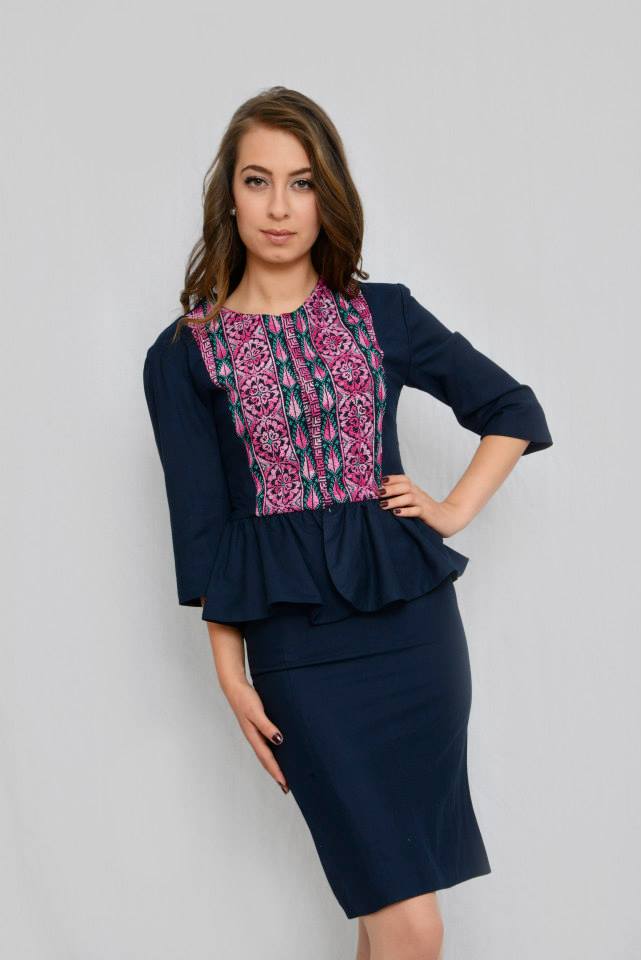Reweaving Palestinian tradition for the new Palestinian woman
Untha is a rare Jerusalem-based label which reimagines traditional Palestinian fashions for the 21st century and pays tribute to Palestinian women.

Tuesday 17 November 2015
Untha is a new and upcoming fashion collection by Natalie Tahan that is set to revive traditional Palestinian fashion. Untha in Arabic means “female”, making this particular collection a kind of tribute to all the Palestinian women who for decades have endured the heavy burden of carrying the Palestinian identity under occupation. Untha is almost a celebratory recognition of the talent, resilience, patience and perseverance of every woman that has fought and struggled to succeed and survive in or out of Palestine.
Natalie Tahhan is the fashion designer behind Untha, whose own name is used on a Jerusalem-based luxury womenswear label. The brand, she says, is the first of its kind to bring international fashion expertise to Jerusalem. The concept is to weave traditional Palestinian elements of intricate hand-sewn embroidery and print into contemporary designs, to create exclusive pieces marked by elegance and innovation.
Fashion has always been a private fascination for Tahhan. Even as a child, she filled endless sketchbooks with designs, colour, and anything that she was drawn to. After completing a degree in womenswear from the London College of Fashion, she continued to pursue her passion by collaborating and working with various design companies in the UK and the Middle East.
“I've always been inspired by fashion as an individual sense of expression. What we wear on a daily basis communicates our personalities, our interests and even how we feel and I find that immensely interesting,” Tahhan explains. “Coming from a background with a rich cultural history I was definitely inspired by the historical expressionism of 19th-century Palestinian embroidery, as it was a communicative language in itself.”
With the guiding hand of Al Mortaqa Women's Organisation, and the creation of Untha, Tahhan was able to put into practice her love of art and design. “‘Untha by Natalie Tahhan' is my latest visual brainchild, and my most significant creation to date, as it is close to home,” she notes. “Having been designed, produced and showcased in Jerusalem, it is the ultimate expression of contemporary Palestinian fashion.”
With funding from the Community Resilience and Development Programme for East Jerusalem (CRDP), Al Mortaqa Women's Organisation was able to provide Tahhan with a platform to create her line, offering a fully equipped fashion studio and a vibrant team to work with. The end result was Untha's Spring/Summer 2015 collection which incorporates floral elements into all of the exclusive prints and Palestinian embroidery motifs. Tahhan felt it was important to create something contemporary that celebrated and highlighted the intricate art of Palestinian embroidery and present it in a novel way.
Palestinian hand-sewn embroidery is very close to Tahhan's heart. “I feel it is a dying art in this day and age. The practice no longer exists on a large scale in our homes and is no longer passed down from mother to child, and so I feel its important to preserve and showcase the beauty of it.” The challenge was in finding the right, skilled artisans to produce the embroidery for the collection.
Palestine, like many other countries in the region, is fighting to keep its identity and maintain national unity which is why throughout the design and production process of the collection, the team behind ‘Untha' were very adamant on creating something in Jerusalem. The Palestinian Arab community in Jerusalem, now physically separated from the surrounding Wesst Bank by the Israeli occupation, is embattled and often overlooked. As such, there is difficulty in preserving its identity and place within Palestine. “‘Untha' was an opportunity for us and for Jerusalem to shine through a different light than to what the international community is used to,” Tahhan notes.
Any project or initiative is bound to encounter problems but if it is in Palestine then these obstacles are likely to be doubled. Palestinians living in the West Bank require permits to enter Jerusalem, which are often difficult to obtain. Tahhan faced some issues with trying to obtain work permits for sewing specialists to come in from the West Bank and work in her Jerusalem studio. This heavily set back the production line and caused problems. “Sometimes the simplest of things are difficult to do in the political environment we live in. However, my work hasn't personally affected me negatively as I am always trying to focus on the positive side of things,” she insists. Tahhan strongly believes that “our strength should lie within what we achieve, and I believe that in itself holds a sense of resilience.”
Tahhan has worked widely in Europe and the Middle East, including with Adidas, the English National Ballet, the QASIMI fashion label and HauteMuse magazine. She was also a finalist of Harper's Bazaar World of Fashion Illustration Competition in 2011, and was selected to redesign a space at Wahm Lounge in the W Hotel – Doha as part of their Cabana Nights Exhibition.
Although she has had showcased her designs in London and Dubai, Tahhan's latest collection is the closest to her heart: “It was truly a labour of love, and being able to achieve it all here in Jerusalem meant a great deal to me.”
Tahhan is putting the finishing touches to her winter collection which is due to be showcased internationally. Keeping to her house style, the collection involves a lot of print and embroidery, but this time the focus is on different Palestinian design elements inspired by the Ottoman era.
The ambitious designer would love to see the line develop and flourish into an intentional brand, and be recognised for its quality and craftsmanship. “Hopefully, it can encourage other Arab designers to manufacture locally despite the hardships, because ultimately it is for our own benefit,” Tahhan concludes.

